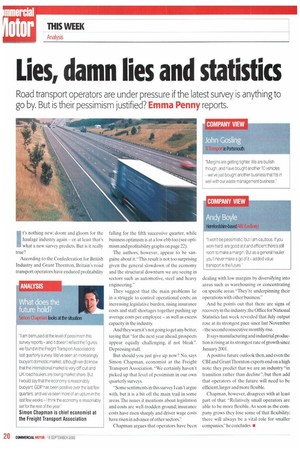Lies, damn lies and statistics
Page 20

If you've noticed an error in this article please click here to report it so we can fix it.
Road transport operators are under pressure if the latest survey is anything to go by. But is their pessimism justified? Emma Penny reports.
It's nothing new; doom and gloom for the haulage industry again or at least that's what a new survey predicts. But is it really true?
According to the Confederation for British Industry and Grant Thornton, Britain's road transport operators have endured profitability "I am bemused at the level of pessimism this survey reports -and it doesn't reflect the figures we found in the Freight Transport Association's last quarterly survey. We've seen an Increasingly buoyant domestic market, although we do know that the international market is very dfflcult and UK road hauliers are losing market share. But I would say that the economy is reasonably buoyant; GDP has been positive over the last few quarters, and we've seen more of an upturn in the last few weeksI think the economy is reasonably set for the rest of the year.'
Simon Chapman is chief economist at the Freight Transport Association
falling for the fifth successive quarter, while business optimism is at a low ebb too (see optimism and profitability graphs on page 22).
The authors, however, appear to be sanguine about it: "This result is not too surprising given the general slowdown of the economy and the structural downturn we are seeing in sectors such as automotive, steel and heavy engineering."
They suggest that the main problems lie in a struggle to control operational costs; an increasing legislative burden, rising insurance costs and staff shortages together pushing up average costs per employee as well as excess capacity in the industry.
And they warn it's not going to get any better, saying that "for the next year ahead, prospects appear equally challenging, if not bleak". Depressing stuff.
But should you just give up now? No, says Simon Chapman, economist at the Freight Transport Association. "We certainly haven't picked up that level of pessimism in our own quarterly surveys.
-Some sentiments in this survey !can't argue with, but it is a bit off the main trail in some areas. The issues it mentions about legislation and costs are well-trodden ground; insurance costs have risen sharply and driver wage costs have risen in advance of other sectors."
Chapman argues that operators have been dealing with low margins by diversifying into areas such as warehousing or concentrating on specific areas. "They're underpinning their operations with other business."
And he points out that there are signs of recovery in the industry; the Office for National Statistics last week revealed that July output rose at its strongest pace since last November the second consecutive monthly rise.
It says manufacturing and industrial production is rising at its strongest rate of growth since January 2001.
A positive future outlook then, and even the CBI and Grant Thornton experts end on a high note: they predict that we are an industry "in transition rather than decline", but then add that operators of the future will need to be efficient, larger and more flexible.
Chapman, however, disagrees with at least part of that: "Relatively small operators are able to be more flexible. As soon as the company grows they lose some of that flexibility; there will always be a vital role for smaller companies." he concludes. •




























































































































































































